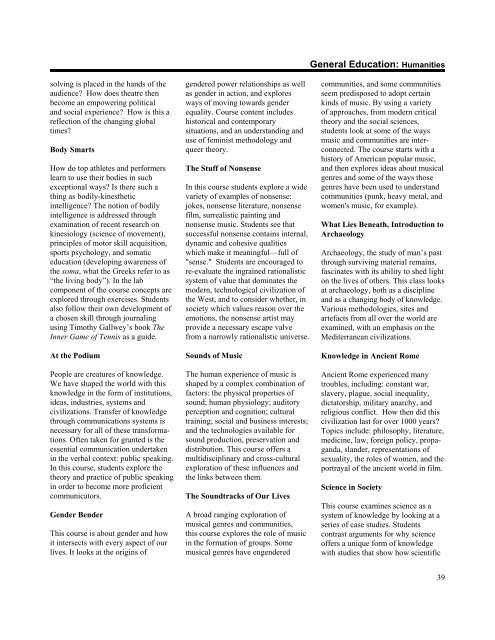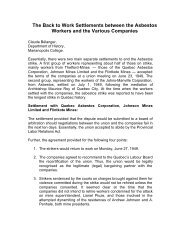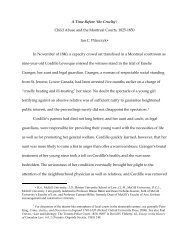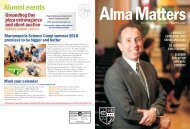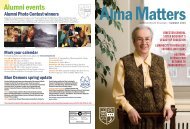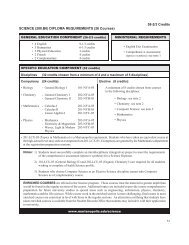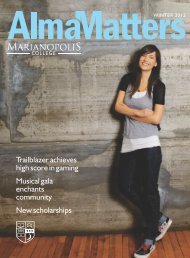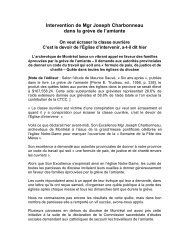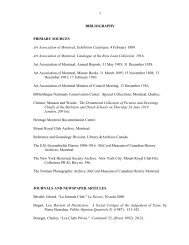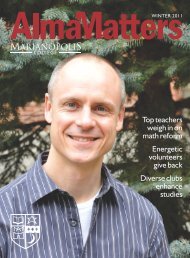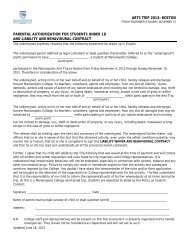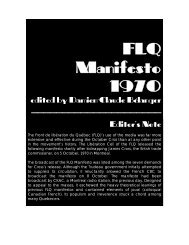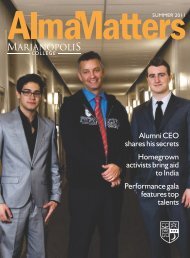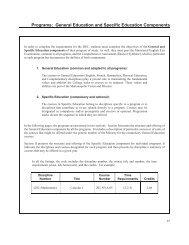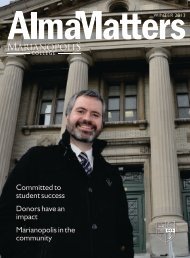General Education: HumanitiesHumanities (345)Reaching every student at thecollegial level, the Humanitiescurriculum is multidisciplinary bydefinition and therefore distinct fromthe traditional disciplines. The courseofferings invite students to reflect onthe dimensions of human experience,and in so doing, to develop a keenerawareness of their own values andcontext.Students are required to take threehumanities courses, one in eachcategory, to receive the collegialdiploma. First-year students shouldselect their courses from the first twocategories only: Knowledge andWorld Views.KnowledgeWorld ViewsEthics345-101-MQ345-102-MQ345-LPH-MSThe courses described are a sampleof what may be offered.Knowledge and its Application345-101-MQ (3-1-3) 2.33 credits- 4 hours of class time- 3 hours of homeworkThis category of Humanities containscourses that study human knowledge,how it is acquired, how it may beanalyzed and used. A particularemphasis is on how these aspects ofknowing affect the values of society.Understanding Canadian SocietyThrough the ArtsWhat is Canadian culture? Thiscourse addresses the complexitiesof Canadian society and its variouscultures and identities. Morespecifically, this course examineshow knowledge of Canadian culturescan be gained through an appreciationof Canadian art. We focus on culturalexperiences that are reflective of pastand emerging trends in Canada andexamples in art will be used to considerhistorical and contemporarycollective issues. We examine a widerange of arts in Canada, from thepaintings of the Group of Sevento the films of Denys Arcand. Afundamental element of the course isan understanding of the developmentof Canadian cultures, including multicultural,Quebecois, and Aboriginalperspectives.Making Montreal: Architectureand Urban IdentityTogether, a city and its buildingscreate an image, a collective urbanidentity for its citizens. Individually,each building and public spacetransmits messages about theidentities and cultural aspirations ofthe people and organizations who payfor them, build them and use them.This course investigates the messagesembedded in Montreal and itsarchitecture by asking two mainquestions: what kinds of knowledgeabout history and identity can bederived from studying the city’sbuildings and layout, and what kindsof knowledge were needed to makethe city in the first place? Through inclassdiscussions and a number offield trips, students develop the abilityto learn from the city, and to appreciatethe knowledge required to build it.The Nature of PropagandaMany of the messages we are exposedto everyday can be considered formsof propaganda, which is commonlydefined as “the systematic propagationof a given doctrine.” Propaganda canbe disseminated through many socialinstitutions, including the government,the media, and schools. It caninsinuate itself undetected ineveryday social discourse, especiallyas its content often overlaps withprevailing ideology. This course isdesigned to help students see throughpropaganda, whatever its source.Truth: Photography, Documentaryand Reality TVThis course is designed to allowstudents to apply a logical analyticalprocess to the questions of howknowledge produced through visualimagery is organized and used. Morespecifically, this course looks at theconcept of truth as it has beenpresented in visual imagery.Beginning with the development ofphotography we analyze documentaryphotographs, television, animationand film in their historical andcultural contexts, including recentdevelopments in reality television.Students consider well-known fakesas well as less obvious cases ofdeception and deceit. Concepts oftruth in war, in history and in art willbe broached, as will issues developingfrom continuing advances in digitaltechnology. In addition the courseintroduces the basic principles ofdocumentary film and asks students todevelop a critical eye for the genre.Power to the PeopleStudents have the opportunity toexplore the new and emerging uses oftheatre in an experiential manner. Theclass discovers and explores howtheatre can be used as an instrumentfor the empowerment of oppressedand disenfranchised peoples throughan examination of theatre for socialchange. What happens when theatreremoves itself from the traditionalpresentational mode, and the powerof decision making and problem38
General Education: Humanitiessolving is placed in the hands of theaudience? How does theatre thenbecome an empowering politicaland social experience? How is this areflection of the changing globaltimes?Body SmartsHow do top athletes and performerslearn to use their bodies in suchexceptional ways? Is there such athing as bodily-kinestheticintelligence? The notion of bodilyintelligence is addressed throughexamination of recent research onkinesiology (science of movement),principles of motor skill acquisition,sports psychology, and somaticeducation (developing awareness ofthe soma, what the Greeks refer to as“the living body”). In the labcomponent of the course concepts areexplored through exercises. Studentsalso follow their own development ofa chosen skill through journalingusing Timothy Gallwey’s book TheInner Game of Tennis as a guide.At the PodiumPeople are creatures of knowledge.We have shaped the world with thisknowledge in the form of institutions,ideas, industries, systems andcivilizations. Transfer of knowledgethrough communications systems isnecessary for all of these transformations.Often taken for granted is theessential communication undertakenin the verbal context: public speaking.In this course, students explore thetheory and practice of public speakingin order to become more proficientcommunicators.Gender BenderThis course is about gender and howit intersects with every aspect of ourlives. It looks at the origins ofgendered power relationships as wellas gender in action, and exploresways of moving towards genderequality. Course content includeshistorical and contemporarysituations, and an understanding anduse of feminist methodology andqueer theory.The Stuff of NonsenseIn this course students explore a widevariety of examples of nonsense:jokes, nonsense literature, nonsensefilm, surrealistic painting andnonsense music. Students see thatsuccessful nonsense contains internal,dynamic and cohesive qualitieswhich make it meaningful—full of"sense." Students are encouraged tore-evaluate the ingrained rationalisticsystem of value that dominates themodern, technological civilization ofthe West, and to consider whether, insociety which values reason over theemotions, the nonsense artist mayprovide a necessary escape valvefrom a narrowly rationalistic universe.Sounds of MusicThe human experience of music isshaped by a complex combination offactors: the physical properties ofsound; human physiology; auditoryperception and cognition; culturaltraining; social and business interests;and the technologies available forsound production, preservation anddistribution. This course offers amultidisciplinary and cross-culturalexploration of these influences andthe links between them.The Soundtracks of Our LivesA broad ranging exploration ofmusical genres and communities,this course explores the role of musicin the formation of groups. Somemusical genres have engenderedcommunities, and some communitiesseem predisposed to adopt certainkinds of music. By using a varietyof approaches, from modern criticaltheory and the social sciences,students look at some of the waysmusic and communities are interconnected.The course starts with ahistory of American popular music,and then explores ideas about musicalgenres and some of the ways thosegenres have been used to understandcommunities (punk, heavy metal, andwomen's music, for example).What Lies Beneath, Introduction toArchaeologyArchaeology, the study of man’s pastthrough surviving material remains,fascinates with its ability to shed lighton the lives of others. This class looksat archaeology, both as a disciplineand as a changing body of knowledge.Various methodologies, sites andartefacts from all over the world areexamined, with an emphasis on theMediterranean civilizations.Knowledge in Ancient RomeAncient Rome experienced manytroubles, including: constant war,slavery, plague, social inequality,dictatorship, military anarchy, andreligious conflict. How then did thiscivilization last for over 1000 years?Topics include: philosophy, literature,medicine, law, foreign policy, propaganda,slander, representations ofsexuality, the roles of women, and theportrayal of the ancient world in film.Science in SocietyThis course examines science as asystem of knowledge by looking at aseries of case studies. Studentscontrast arguments for why scienceoffers a unique form of knowledgewith studies that show how scientific39
- Page 2 and 3: VISIONMarianopolis College, drawing
- Page 4 and 5: GENERAL INFORMATION: Introduction t
- Page 6 and 7: AdmissionsOUT-OF-PROVINCEAPPLICANTS
- Page 8 and 9: Financial Information• Birks Fami
- Page 10 and 11: Financial InformationConfirmation F
- Page 12 and 13: Academic Information• Failure (EC
- Page 14 and 15: Academic InformationThose who are a
- Page 16 and 17: Rules and Regulationsand whether su
- Page 18 and 19: EDUCATIONAL RESOURCES & SERVICESAss
- Page 20 and 21: Educational Resources and ServicesS
- Page 22 and 23: CHOOSING A PROGRAMDiploma Programs
- Page 24 and 25: CertificatesSpecial InterestCertifi
- Page 26 and 27: Programs: General Education and Spe
- Page 28 and 29: General EducationGENERAL EDUCATION
- Page 30 and 31: General Education: Englishidentifyi
- Page 32 and 33: General Education: Englishas the fi
- Page 34 and 35: General Education: Englishintended
- Page 36 and 37: General Education: Frenchand curren
- Page 38 and 39: General Education: Frenchce cours t
- Page 42 and 43: General Education: Humanitiesunders
- Page 44 and 45: General Education: Humanitiespracti
- Page 46 and 47: General Education: Humanitiespracti
- Page 48 and 49: General Education: Physical Educati
- Page 50 and 51: General Education: ComplementaryCom
- Page 52 and 53: General Education: ComplementaryMod
- Page 54 and 55: SECTSpecificEducation Component- Sc
- Page 56 and 57: Science: Biology - ChemistryBiology
- Page 58 and 59: Science: Mathematics - PhysicsR and
- Page 60 and 61: 56-2/3 to 58 CreditsSOCIAL SCIENCE
- Page 62 and 63: Social Science: Profiles - General
- Page 64 and 65: Social Science: Psychology ProfileE
- Page 66 and 67: Social Science: Law, Society and Ju
- Page 68 and 69: Social Science: Honours CommerceHon
- Page 70 and 71: Social Science: Anthropology - Biol
- Page 72 and 73: Social Science: History - Mathemati
- Page 74 and 75: Social Science: Political Sciencedi
- Page 76 and 77: Social Science: Religion - Sociolog
- Page 78 and 79: 54-2/3 CreditsCREATIVE ARTS, LITERA
- Page 80 and 81: Creative Arts, Literature and Langu
- Page 82 and 83: Creative Arts, Literature and Langu
- Page 84 and 85: Creative Arts, Literature and Langu
- Page 86 and 87: Creative Arts, Literature and Langu
- Page 88 and 89: Creative Arts, Literature and Langu
- Page 90 and 91:
Creative Arts, Literature and Langu
- Page 92 and 93:
58-2/3 CreditsMUSIC (501.A0) DIPLOM
- Page 94 and 95:
MusicEar Training and Theory IV551-
- Page 96 and 97:
59-1/3 CreditsARTS AND SCIENCES (70
- Page 98 and 99:
Arts and Sciences: English - Humani
- Page 100 and 101:
Arts and Sciences: Art History - Ar
- Page 102 and 103:
Arts and Sciences: Mathematics - Mu
- Page 104 and 105:
Arts and Sciences: Multidisciplinar
- Page 106 and 107:
56-2/3 to 58 CreditsLIBERAL ARTS (7
- Page 108 and 109:
Liberal Artsof evolution; the first
- Page 110 and 111:
Liberal ArtsOptionalIn addition to
- Page 112 and 113:
Teaching FacultyFLEISCHER, George T
- Page 114 and 115:
Teaching FacultyTRILLER, Bernice Sh
- Page 116:
INDEX II: Programs and CoursesGener


